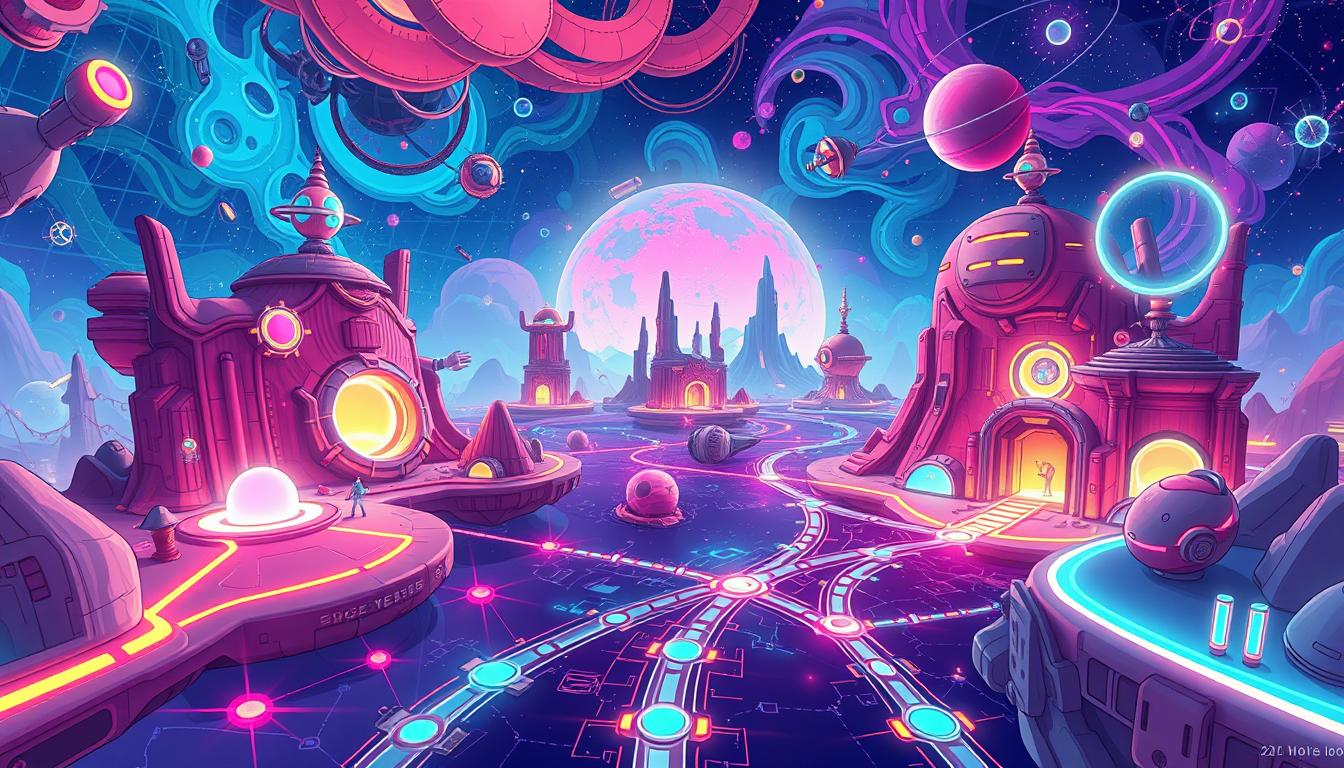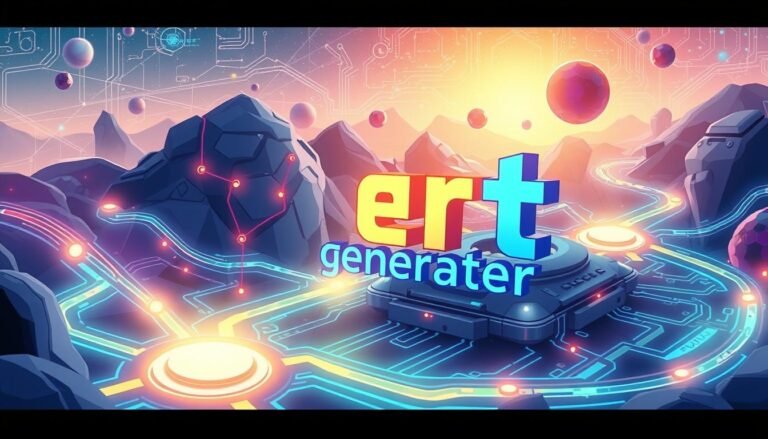The Ultimate Guide to the Metaverse: How to Prepare for Virtual Worlds
Did you know the metaverse market could hit $507.8 billion by 2030? It’s expected to have over 2.6 billion users. This shows how fast and big virtual worlds are growing. It’s key for people and companies to get ready for this digital change.
As we move into a new digital age, knowing about the metaverse is vital. This guide will give you the tools and info to explore this new tech world.
The metaverse is more than just a trend. It’s changing how we interact, work, and have fun online. It brings new chances like virtual reality and owning digital assets. But, we need to get ready for these changes.
If you love tech, run a business, or just want to know about the future of online interaction, this guide is for you. It will explain the metaverse and give tips to get you ready for virtual worlds.
Key Takeaways
- The metaverse market is expected to reach $507.8 billion by 2030
- Over 2.6 billion users are projected to engage with the metaverse by 2030
- Understanding key metaverse components is crucial for preparation
- Virtual reality and digital asset ownership are central to the metaverse experience
- Proper preparation is essential for navigating the metaverse successfully
Understanding the Concept of the Metaverse
The metaverse is a new mix of virtual reality and digital experiences. It has become very popular lately. Big tech companies are spending billions to make it happen.
Definition and Origins
The metaverse is a digital world that links virtual reality, augmented reality, and the internet. It started in the 1980s with virtual reality. Augmented reality came in the early 1990s. The term “metaverse” became famous when Facebook changed its name to Meta.
Key Components of the Metaverse
A good metaverse strategy has a few key parts:
- Virtual worlds and avatars
- Real-time communication
- User-created content
- Virtual economy with cryptocurrencies and NFTs
- Cross-platform connectivity
- Immersive technologies like VR and AR
The Convergence of Virtual and Physical Realities
The metaverse tries to mix digital and physical worlds. Companies like Microsoft, Google, and Sony are working hard to create immersive experiences. It will change how we work, play, and connect online.
The metaverse is not just about gaming – it’s a new frontier for education, business, healthcare, and social interaction.
As virtual reality gets better, the metaverse will change our digital world. It will open up new chances for creativity, business, and connection.
The Evolution of Virtual Worlds
Virtual worlds have evolved a lot since they started. They’ve moved from simple text games to full 3D worlds. Now, we’re on the edge of a new era where digital and real worlds mix.
The idea of the Metaverse is getting a lot of attention, especially after COVID-19. It’s a network of virtual spaces that could change how we interact and work online. Soon, knowing how to navigate the Metaverse will be key for everyone.
- Avatar-based interaction
- Persistent virtual worlds
- User-generated content
- Virtual economies
These features create deep experiences, from virtual events to stories made together. With tech getting better, platforms like Unity and Unreal Engine are making virtual worlds more advanced.
“The Metaverse is a persistent and interconnected network of 3D virtual worlds that will serve as the gateway to most online experiences.” – Matthew Ball
The future of virtual worlds is exciting, with VR, AR, and blockchain leading the way. As we keep improving these digital spaces, the possibilities for education, healthcare, and fun are endless. Now, we must navigate this new world wisely, making sure it’s fair, private, and ethical.
Key Technologies Driving the Metaverse
The Ultimate Guide to the Metaverse explores new technologies that are changing virtual worlds. These advancements are making our digital interactions, work, and play more exciting.
Virtual Reality (VR) and Augmented Reality (AR)
VR and AR are key to immersive experiences in the metaverse. VR headsets take users into digital worlds. AR adds virtual elements to our real world. By 2027, 30% of business investments in metaverse tech will be in virtual workspaces.
Blockchain and Cryptocurrency
Blockchain technology ensures safe digital asset ownership and transactions. It prevents failures by controlling data in a decentralized way. Cryptocurrencies and NFTs make buying, selling, and trading virtual goods easy.
Artificial Intelligence and Machine Learning
AI makes interactions in the metaverse smarter and more personal. It creates lifelike NPCs and tailors experiences. Yet, only 10% of companies see big AI benefits, showing there’s more to explore in the metaverse.
For businesses, planning for virtual reality is key to entering the metaverse. The 3D reconstruction market is expected to grow to $2 billion by 2030. This shows how important spatial technologies are for creating engaging digital spaces.
The Ultimate Guide to the Metaverse: How to Prepare for Virtual Worlds
Getting ready for the metaverse is easier than you might think. This guide will help you dive into virtual worlds with confidence. Start by choosing the right device – you can access the metaverse using smartphones, computers, or gaming consoles. For a more immersive experience, consider investing in virtual reality headsets or augmented reality glasses.
Create your digital identity by designing an avatar. The metaverse offers various avatar types, including 2D, 3D, VR, and full-body options. Pick one that best represents you in the virtual space. Remember, your avatar is your digital self, so have fun with it!
Here are some virtual world tips to enhance your metaverse journey:
- Explore popular platforms like Fortnite, Minecraft, or Roblox
- Attend virtual events such as concerts, trade shows, or job fairs
- Learn about digital assets and NFTs
- Join online communities to connect with other metaverse enthusiasts
The metaverse offers exciting opportunities for work and play. You could become a virtual tour guide, fashion designer, or event director. If you’re creative, try your hand at 3D modeling or storytelling. The possibilities are endless!
To stay updated, take online courses about the metaverse. Platforms like Coursera offer classes that can help you understand this evolving digital landscape. With these tools and knowledge, you’ll be well-prepared to explore and thrive in the fascinating world of the metaverse.
Exploring Virtual Economies and Digital Assets
Virtual economies in the metaverse are changing how we view digital assets and transactions. These online spaces let us buy, sell, and trade virtual goods. Cryptocurrencies like Bitcoin and Ethereum are key, helping users make real money from their virtual activities.
The idea of earning from in-game achievements is becoming popular. This change has led to the creation of decentralized marketplaces. Here, users can trade assets directly. Blockchain technology makes these transactions secure and transparent, building trust in these digital worlds.
Understanding virtual asset ownership is vital for a good metaverse strategy. Users now have more control over their digital assets. They can transfer them securely. The value of these assets is determined by market demand and user interest.
- Daily average price of metaverse land transactions exceeded $18,000 in January 2022
- Average prices for land in Sandbox and Decentraland were around $5,300 in 2021
- A Snoop Dogg fan paid $450,000 to become his virtual neighbor in Snoop Verse
The metaverse is drawing big investments, with companies like JP Morgan joining in. As virtual economies grow, they offer new ways to make money and include more people. But, we must tackle security, regulation, and abuse concerns to keep these digital spaces thriving.
Social Interactions and Community Building in the Metaverse
Navigating the Metaverse opens up exciting possibilities for social interaction and community building. As virtual reality exploration becomes more prevalent, users are finding new ways to connect and engage in digital spaces.
Avatar-Based Communication
In the Metaverse, avatars serve as digital representations of users. These customizable characters allow for personalized interactions, making conversations feel more lifelike. Platforms like VRChat and Oculus Rooms offer immersive social experiences, laying the groundwork for future Metaverse interactions.
Virtual Events and Gatherings
The Metaverse is becoming a hub for virtual events and gatherings. From concerts to conferences, these digital spaces offer unique opportunities for socializing and networking. For example, Minecon, an annual festival celebrating Minecraft, brings together players from around the world, fostering a sense of global community.
Building Relationships in Digital Spaces
Creating meaningful connections in the Metaverse requires new approaches to relationship building. Games like Animal Crossing: New Horizons showcase how digital spaces can promote inclusivity and representation. Users can express themselves freely through customizable avatars, fostering a sense of belonging and individual expression.
- Engage in shared activities and collaborative projects
- Participate in community forums and discussion groups
- Attend virtual meetups and social events
- Join interest-based clubs or organizations within the Metaverse
As we continue exploring virtual reality, the Metaverse promises to revolutionize how we interact and build communities in digital realms. By embracing these new forms of connection, users can create rich, meaningful relationships that transcend physical boundaries.
Metaverse Platforms and Ecosystems
The Ultimate Guide to the Metaverse explores the many platforms and ecosystems. These are shaping the virtual world. As you get ready for the Metaverse, knowing the virtual worlds is key.
Platforms like Decentraland and The Sandbox use blockchain for decentralized experiences. Users can create, own, and make money from digital assets. Gaming metaverses, such as Fortnite and Roblox, focus on social interaction and user content.
For work, Meta Horizon Workrooms and Microsoft Mesh create virtual workspaces. They let remote teams meet and work together in virtual spaces, no matter where they are.
- Decentraland: A virtual world where users own and develop land parcels
- Fortnite: Hosts virtual concerts and brand collaborations
- Meta Horizon Workrooms: Facilitates virtual meetings and collaboration
- Roblox: A platform for user-created games and experiences
As you explore The Ultimate Guide to the Metaverse, remember each platform is unique. Your choice depends on what you’re interested in. Whether it’s socializing, gaming, working, or creating, diving into these ecosystems is crucial for your Metaverse journey.
Creating and Customizing Your Virtual Identity
The metaverse is a place where you can express yourself in new ways. To get ready, learning about avatars, personal branding, and digital fashion is important. This guide will show you how to make a unique virtual presence.
Designing Your Avatar
Your avatar is your digital self in the metaverse. When creating your avatar, you can choose between realistic or stylized looks. Some avatars move like you do, while others are simpler for better performance.
Think about how your avatar matches your real-life identity or the image you want to show.
Personal Branding in Virtual Worlds
Building a strong personal brand in the metaverse is essential. Your avatar’s look, actions, and interactions shape your digital identity. Being consistent across different virtual spaces makes you more recognizable.
Consider how your virtual self reflects your values and goals.
Digital Fashion and Accessories
The metaverse introduces new ways to express yourself through digital fashion. You can change your avatar’s clothes, hairstyles, and accessories. There are free and paid options for personalizing your look.
As digital fashion grows, you might buy unique, blockchain-verified items to stand out.
“In the metaverse, your avatar is your canvas for self-expression. Embrace the freedom to create and evolve your digital identity.”
Your virtual identity can change over time. Try different styles and personas to find what feels true to you. By carefully crafting your virtual presence, you’ll be ready to engage and succeed in the metaverse.
Virtual Real Estate and Digital Land Ownership
Virtual reality planning and metaverse strategy now include digital real estate. This new area offers exciting chances for investment and creativity in virtual worlds.
The virtual property market is booming. In 2021, Sandbox LAND saw a staggering 15,000% growth. Metaverse real estate sales reached $501 million across major platforms that year. Experts predict this figure will double to $1 billion in the following year.
Investing in digital land is different from traditional real estate. It involves cryptocurrency and offers potential for rapid growth. The average price of land parcels in popular metaverse platforms jumped from $1,265 to $12,684.
The metaverse real estate market is estimated to reach $828.95 billion by 2028.
Location matters in virtual worlds too. Prime spots near popular attractions or high-traffic areas command higher prices. This mirrors real-world property values. Some companies are even leasing virtual spaces to retail brands for e-commerce and advertising.
To maximize returns on virtual land investments:
- Create immersive games
- Develop retail spaces
- Build token-gated exclusive clubs
- Explore innovative revenue-generating ideas
Successful virtual reality planning requires understanding the risks. Secure your investments with strong passwords and two-factor authentication. Research thoroughly and choose metaverse platforms with proven track records for your metaverse strategy.
Content Creation and Monetization in the Metaverse
The metaverse offers exciting chances for creators and businesses. To succeed, optimizing your virtual world is crucial. You can create everything from immersive concerts to unique digital items.
User-Generated Content Opportunities
In the metaverse, users can make and share virtual things. They can create environments and experiences. For example, virtual reality concerts let people interact with virtual stages and performers.
Virtual World Development
Platforms like MayaaVerse let businesses and creators build global presences. These virtual worlds break down barriers, making cultural and educational resources more accessible. Businesses can reach more people with virtual events, offering unique and interactive experiences.
Monetizing Your Metaverse Creations
The Ultimate Guide to the Metaverse covers how to make money. Creators can earn from selling unique digital items like art and fashion. Businesses can make money through:
- Ticket sales for virtual events
- Sponsorships
- Selling virtual goods
- In-app purchases
- Advertising within virtual environments
- Subscription models for ongoing virtual services
To succeed, make your in-world store look good. Promote your items on social media and through influencers. With the right strategy, the metaverse can be very profitable for creators and businesses.
Privacy, Security, and Ethics in Virtual Worlds
As virtual reality grows, keeping personal data safe becomes key. The digital world mixes our real and online lives. This creates new challenges for protecting our information.
In virtual worlds, every action leaves a digital mark. This includes everything from who we are to how we look. If not kept safe, this data can be stolen or used wrongly.
- Understand data collection policies of virtual platforms
- Set strong privacy controls
- Be cautious about shared information
- Use robust passwords with two-factor authentication
Developers of the metaverse have a big responsibility. They must respect users’ privacy and keep data open. It’s important to balance fun experiences with keeping our data safe.
The metaverse offers endless possibilities for creativity and exploration, but we must ensure it benefits humanity through ethical development and robust privacy protections.
As we move into virtual worlds, learning about privacy is key. Knowing how to protect ourselves lets us enjoy virtual reality safely. This way, we keep our digital rights and information secure.
The Future of Work and Education in the Metaverse
The metaverse is changing how we work and learn. Virtual worlds let us collaborate and learn in new ways. They’re preparing us for the digital economy.
Virtual Offices and Remote Collaboration
Virtual reality is creating immersive work spaces. Tools in the metaverse make team work better. This could make work more productive.
Companies are moving to virtual offices. This helps employees get used to metaverse tools. It might change how we work.
Immersive Learning Experiences
Learning in the metaverse is exciting. Prisms VR is used in over 130 schools in the U.S. and abroad. It makes students more confident and engaged.
VR helps students understand and remember better. It also keeps them motivated. This technology is changing education.
Skills for the Metaverse Economy
To work in the metaverse, we need new skills. Skills like 3D modeling and virtual world design are important. Employees need to learn for virtual environments.
As the digital and physical worlds mix, we must adapt. This is crucial for success in the metaverse.
“The metaverse is not just a new technology; it’s a new way of working, learning, and interacting. Embracing it now prepares us for the future.”
For tips on virtual worlds, practice with VR tools. Learn about 3D design and stay updated on metaverse news. By doing this, we can shape the future of work and education.
Preparing for the Metaverse: Essential Skills and Tools
The metaverse is changing how we work and play. A guide to prepare for it is essential. With millions of users worldwide, the need for metaverse experts is growing. You’ll need skills in virtual reality, blockchain, and digital creativity to keep up.
Starting your virtual reality journey requires the right tools. You’ll need fast internet and a strong GPU for smooth virtual experiences. VR headsets like Meta Quest and HTC Vive offer amazing immersion. Platforms like Decentraland and Roblox let you create and earn in virtual worlds.
Learning game engines like Unity and Unreal Engine is crucial. They help create virtual experiences. Also, focus on customizing avatars and owning virtual land. These skills will help you succeed in the metaverse.
Source Links
- Learn Metaverse: The Ultimate Guide to Virtual Worlds | Metaverse911|Meta-verse911
- What is the Metaverse? An Explanation and In-Depth Guide
- What is the Metaverse? Virtual Worlds and what you NEED to Know!
- What is the Metaverse? Guide & Explanation
- What is the Metaverse? Step-by-Step Beginners Guide 2024 [UPDATED] – Blockchain Council
- Metaverse Development: The Ultimate Guide To Building Your Virtual World
- The Metaverse: Fully Revised and Updated Edition: Building the Spatial Internet
- The Metaverse: Navigating the Future of Virtual Worlds
- 7 Top Technologies for Metaverse Development
- How to Build Metaverse: Complete Guide for 2024 & Beyond
- What is a Metaverse? A Comprehensive Guide
- How to Access the Metaverse: A Step-by-Step Guide
- The Ultimate Guide to Creating Your Own Metaverse World
- Exploring the Metaverse: Crypto’s Role in Virtual Worlds
- No title found
- What is the metaverse? — updated 2024
- The Best Community Building Practices in the Metaverse
- Exploring the Metaverse: A Comprehensive Guide to Virtual Worlds
- Metaverse platform ecosystems – Electronic Markets
- How to Create Metaverse Avatars: Ultimate Guide – 3D-Ace
- Detailed Guide to Building Your Digital Identity in 2024 – Meetaverse
- The Ultimate Guide to Metaverse Virtual Real Estate
- Navigating Secure Virtual Real Estate: A Guide to Metaverse Ownership – Landvault Blog
- The Future of Content Creation in the Metaverse
- A Guide to Monetizing Metaverse Events
- Ethics and Privacy in Metaverse development
- Navigating Metaverse Privacy: A Comprehensive Guide
- How Will the Metaverse Affect the Future of Work?
- How the Metaverse Can Transform Education
- Exploring the Metaverse: The Next Frontier in Education
- The Ultimate Guide to Understanding and Navigating the World of Metaverse
- How to access the Metaverse: Your guide to the digital realm







